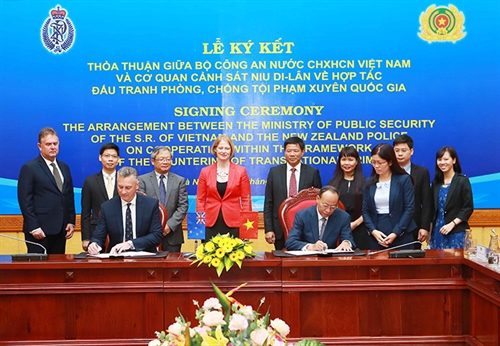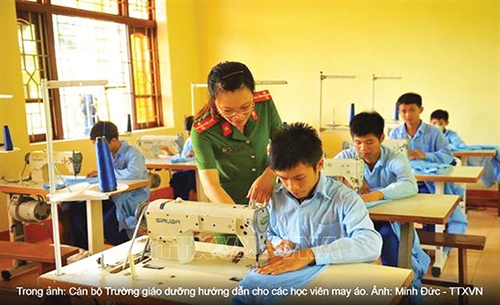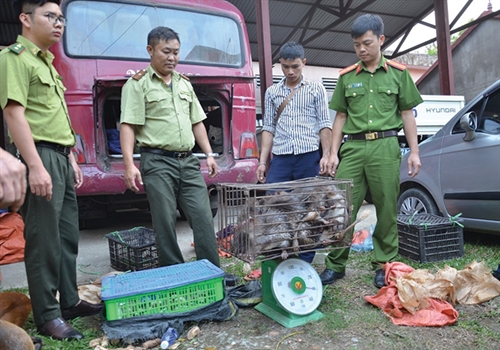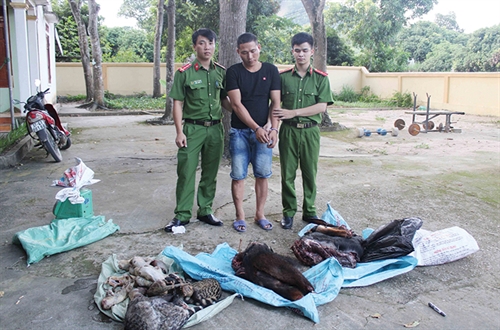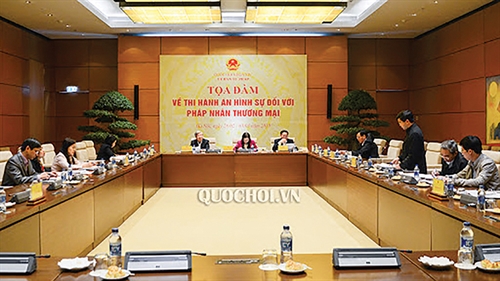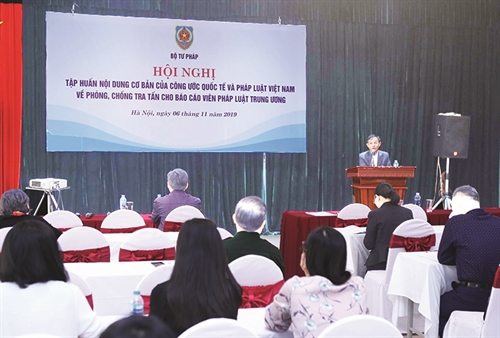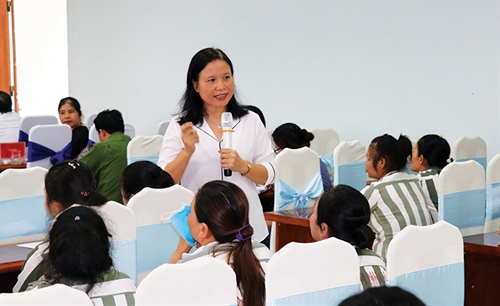Le Huynh Tan Duy[1]
Ho Chi Minh City Law University
Spoken and written language used in criminal proceedings
The principle of use of language in criminal proceedings is a fundamental one of Vietnam’s criminal procedure law. Accordingly, the language used in criminal proceedings is Vietnamese, both in writing and orally. Participants in criminal proceedings may speak and write in the languages of their own nationalities, and in this case interpreters are required[2]. In other words, in criminal proceedings foreign suspects may speak and write in the languages of their nationalities and Vietnamese proceeding-conducting bodies have to appoint interpreters for them. This provision, however, is not specific enough about “languages of nationalities” of proceeding participants, especially in case they are nationals of countries where more than one official language are used and they can speak fluently these languages, or they are Vietnamese of foreign origins (for example, Chinese origin). It also remains unclear whether proceeding-conducting bodies have to translate procedural documents (summons, investigation conclusions, indictments, first-instance judgments, protests, etc.) into the languages which foreign suspects speak before serving such documents to them. As per the 2015 Criminal Procedure Code (the Code), interpreters have to interpret only contents of rulings of trial panels and other matters related to defendants[3].
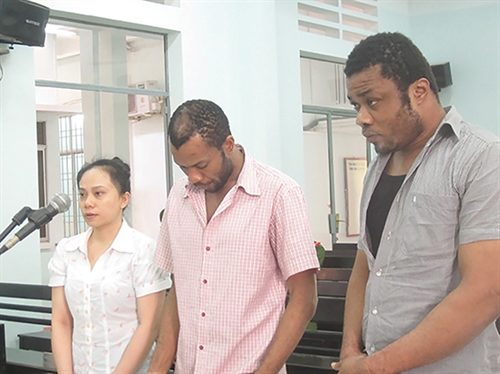 |
| Vietnamese national Le Thi Kim Quyen (left) and Nigerian nationals Christian Sunday (right) and Deke Collins (middle) are sentenced to 10 years of imprisonment for swindling__Photo: Internet |
In reality, in criminal cases involving foreign suspects, proceeding-conducting bodies write all case files in Vietnamese and later requested interpreters to interpret and read out them to foreign suspects. This method, however, might lead to a situation that foreign defendants retract their previous statements at court for the reason that they misunderstood the interpreted questions in the previous proceeding stages. That’s why in the future the Ministry of Public Security, Ministry of National Defense, Supreme People’s Procuracy, and Supreme People’s Court should jointly guide in detail the Code’s provisions on this principle in order to guarantee the legitimate rights of foreign suspects and facilitate the taking of their statements and testimonies by proceeding-conducting bodies.
If having grounds to believe that a foreign suspect can speak fluently a common language other than the language of his/her home country, proceeding-conducting bodies may appoint an interpreter of such language for him/her and explain the reason. For the accused who are Vietnamese of foreign origins, right from the stage of investigation, investigators have to determine whether or not they can fluently speak Vietnamese. Interpreters must be sought for in case such persons cannot fluently speak Vietnamese or themselves request interpreters. A minutes should be made if they do not request interpreters.
Future guidance on this language principle should define the responsibility of proceeding-conducting bodies to invite translators to translate important procedural documents that mark the conclusion of a proceeding stage and commencement of the subsequent stage or show the final decision or ruling of each of these bodies, such as investigation conclusions, indictments, decisions to bring criminal cases for trial, judgments, protests, etc., into the languages of countries of which foreign suspects are nationals. If the official languages of their countries are minority languages while they can fluently speak a common language, the aforesaid documents may be translated into such common language to help them clearly understand their contents and therefore better prepare their defense.
Interpreters and translators in criminal proceedings
Interpreters and translators are persons who are able to interpret or translate languages and requested by criminal proceeding-conducting bodies in case proceeding participants cannot speak Vietnamese or there are procedural documents written in a language other than Vietnamese[4]. Besides this, there are no other provisions guiding conditions and criteria for acting as interpreters and translators for parties involved in criminal cases. Neither does the criminal procedure law provide for agencies or organizations that manage and recommend interpreters and translators qualified for being invited by proceeding-conducting bodies. In reality, the legal knowledge of interpreters and translators in criminal proceedings, who have usually worked at provincial-level Police Departments’ immigration management offices or border-guard stations, is limited. They could only generally interpret or translate statements, questions and answers of proceeding participants and contents of procedural documents.
That’s why the criminal procedure law should specify conditions and criteria for acting as interpreters and translators in criminal proceedings, and proceeding-conducting bodies should contact law-training institutions for appointment of lecturers and students who have good command of foreign languages to participate in criminal proceedings as interpreters or translators for foreign suspects.
Right to defense of foreign suspects
Vietnam’s criminal procedure law has no separate provision for foreign suspects to exercise their right to defense. In other words, their right to defense is the same as that of Vietnamese, and “foreign nationality” is not the ground for a foreign suspect to have a defense counsel appointed for him/her.
However, in reality, Vietnamese proceeding-conducting bodies, diplomatic missions and consular offices might have contacted and requested bar associations to appoint defense counsels for foreigners charged of criminal offenses and have usually invited interpreters to assist defense counsels in visiting and taking statements from them. Ineffective or poor defense for foreign suspects over the recent years has been attributable to the unsatisfactory qualifications of defense counsels themselves as well as difficulties in finding interpreters qualified to help defense counsels. Additionally, the current criminal procedure law makes no mention on financial support for defense counsels to pay for interpreters helping them take statements from foreign suspects.
The principle that all people are equal before law in criminal proceedings[5] has somehow prevented lawmakers from adding a provision that foreign suspects are automatically entitled to have defense counsels regardless of the crimes of which they are accused. However, in fact the appointment of defense counsels for foreigners who allegedly commit offenses in the Vietnamese territory may be grounded on the principle that criminal proceedings against them shall be conducted in accordance with the provisions of treaties to which Vietnam is a contracting party or on the principle of reciprocity[6].
In order to appoint defense counsels for foreign suspects in a more timely and effective manner, there should be a mechanism for coordination among central-level proceeding-conducting bodies, the Ministry of Foreign Affairs, Ministry of Justice, Ministry of Finance and Vietnam Bar Federation, and specific provisions on payment of remuneration for defense counsels in criminal proceedings and provision of financial support for them to pay for interpreters.
Competence to investigate, prosecute and adjudicate criminal cases involving foreign suspects
The adjudicating jurisdiction over criminal cases involving foreigners was guided by the Supreme People’s Court in Official Letter 81/2002/TANDTC dated June 10, 2002. Accordingly, criminal cases, in which defendants, victims, persons with related rights or obligations, or civil plaintiffs are foreigners or foreign institutions, fall under the jurisdiction of provincial-level people’s courts. This guidance is now revised and included in Article 268.2.b of the Code as follows: “Provincial-level people’s courts and military zone-level military courts may conduct first-instance trial of criminal cases in which defendants, victims and involved parties reside abroad[7] or property related to these cases is located abroad”. Compared to Official Letter 81, the Code expand the range of criminal cases falling under the jurisdiction of provincial-level people’s courts to criminal cases in which civil respondents reside abroad[8] or property related to these cases is located abroad.
Unlike the jurisdiction to adjudicate such cases, the competence to investigate and prosecute criminal cases involving foreigners remains unspecific. In fact, it can be understood that criminal cases determined to fall under the first-instance adjudicating jurisdiction of provincial-level people’s courts or military zone-level military courts must be investigated and prosecuted by investigating bodies and procuracies at the same level.
Particularly, the adjudicating jurisdiction over a crime committed by a foreigner onboard a Vietnamese aircraft or seagoing ship operating outside Vietnam’s territorial airspace or territorial sea rests with a Vietnamese court of the locality where the first airport or seaport of return is located or where such aircraft or seagoing ship has been registered[9]. However, this provision only designates the court of adjudicating jurisdiction by locality, but not by level. In reality, crimes of this type are rare and have mostly been dealt with by provincial-level courts for the reason that their investigation and prosecution were related to many localities and fields and therefore could fall beyond the capabilities of district-level proceeding-conducting bodies.
For diplomatic reasons, the competence to investigate, prosecute and adjudicate criminal cases involving foreigners should not be vested in district-level proceeding-conducting bodies because it would be very complicated to identify and verify offenders, settle civil liabilities, and seek qualified interpreters and translators for involved parties. Besides, during criminal proceedings courts have also had to settle civil liabilities, which include disputes and claims required by Article 35.3 of the 2015 Civil Procedure Code to be handled by provincial-level people’s courts if involving parties residing or property located abroad. For the above reasons, the criminal procedure law should clearly provide that all criminal cases involving foreign suspects fall under the handling competence of provincial-level or military zone-level proceeding-conducting bodies. Specifically, Article 270 of the Code should be revised as follows:
“Article 270. Jurisdiction to adjudicate crimes committed on board aircraft or seagoing ships of the Socialist Republic of Vietnam operating outside the airspace or territorial sea of Vietnam
A crime committed on board an aircraft or a seagoing ship of the Socialist Republic of Vietnam which is operating outside the airspace or territorial sea of Vietnam falls under the adjudicating jurisdiction of a Vietnamese provincial-level people’s court or military zone-level military court of the locality where the first airport or seaport of return is located or where such aircraft or seagoing ship has been registered.”
International cooperation in criminal proceedings
Investigation, prosecution and adjudication of foreigners usually need support and assistance from proceeding-conducting bodies of their home countries. Besides, criminal cases involving foreigners often see consular intervention by their embassies or consulates.
In addition to complying with Vietnam’s criminal procedure law and law on legal assistance and other relevant regulations, international cooperation in criminal proceedings is also subject to treaties to which Vietnam is a contracting party or the principle of reciprocity. However, to date Vietnam has concluded just a few bilateral agreements on mutual legal assistance in criminal matters, such as consular notification and visits for persons arrested, held in custody or detained, extradition and handover of persons sentenced to imprisonment. This has caused great difficulties to the settlement of criminal cases involving foreign suspects. In reality, it usually took three to seven months to verify identifications and criminal records of foreign suspects. Such difficulties would be tougher in case masterminds reside abroad and the investigation depends largely on the Interpol’s assistance.
In order to overcome the above difficulties, Vietnam should, together with countries that have signed agreements on mutual legal assistance in criminal matters, add to these agreements more specific provisions on verification of criminal records of suspects, seizure and handover of documents and objects to serve the settlement of criminal cases, etc. More importantly, Vietnam should enter into mutual assistance agreements with more countries in order to create more conditions for its proceeding-conducting bodies to deal with criminal cases involving foreign suspects residing abroad.-


